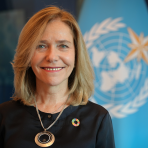Intervention during the High-Level Side Event: “From Coast to Community: Building Resilience Through Early Warnings”
Minister Kamina Johnson Smith, Executive Director Annemarie Hou, Excellencies, Distinguished Delegates, and Esteemed Representatives of Partner Organizations
It is an honor to be with you today for this important dialogue at the 2025 United Nations Ocean Conference.
Allow me to begin by expressing sincere appreciation to Ms. Annemarie Hou, Executive Director of the United Nations Office for Partnerships, for organizing this event.
I wish to express my gratitude for her leadership in helping bring together such a diverse and committed group of partners.
I stand before you today as a scientist and a meteorologist with an uncomfortable message. We cannot negotiate with laws of physics.
Greenhouse gas concentrations are at record highs. These drives rising temperatures, extreme weather, sea level rise, ocean warming and acidification, and more intense cyclones and flooding.
The last 10 years have been the hottest on record. A recent WMO report predicts that this trend will continue.
There is a 70 percent chance that the 2025-2029 five-year average will be more than 1.5°C above the pre-industrial era.
Every fraction of a degree makes a difference to the risks we will face.
Adaptation and coastal resilience are not optional. They are essential.
Early warnings are a major part of that adaptation and resilience. They save lives and protect economies. Early warnings work. They must work for everyone, everywhere.
This is why WMO is committed to supporting Small Island Developing States and coastal communities.
They are on the frontline. They need timely and actionable forecasts. They need accurate information on marine hazards like tropical cyclones and coastal flooding.
And while weather impacts are felt at the local level, we cannot face them without global cooperation.
International data collection and exchange must be strengthened to improve localized predictions – because the weather does not respect any borders. The challenges are immense, but there is hope.
There are many success stories that highlight the resilience and leadership of communities.
In the Caribbean, excellent forecasts from the WMO community, strong regional collaboration, and decisive local leadership limited the loss of life during Hurricane Beryl in 2024. It was the earliest category 5 hurricane ever recorded in the region.
In Mozambique, improved forecasts, communication and community mobilization saved thousands of lives and millions in damages from Tropical Cyclone Freddy in 2023.
In Bangladesh and Myanmar, accurate early warnings before tropical cyclone Mocha in 2023 prevented huge casualties. These forecasts enabled humanitarian agencies reach those most at risk, preventing devastating loss of life.
And in the Philippines, back-to-back typhoons in 2024 tested the country’s resilience. Once again, it was early warnings and local leadership which helped make the difference between life and death.
Excellencies, colleagues, friends.
This year, WMO celebrates its 75th anniversary as a UN specialized agency.
We are proud that weather forecasts are better than ever before, and we are excited at the prospect of even greater improvements ahead.
By utilizing new technologies and addressing systemic data gaps, improved localized predictions can be made.
WMO addresses these gaps through the “10,000 ships for the ocean” initiative, launched this week, and the Systematic Observations Financing Facility.
But even the perfect forecast will fail if it doesn’t reach the people who need it, in a form they can understand and act on.
And for that, we need strengthened National Meteorological and Hydrological Services partnering with community leadership. We need trust.
Let us all work together to ensure that science serves all communities, and that no one is left behind. I thank you.
Statement by


